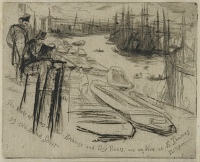Freetext search terms: price's
The Little Pool | ||
| Number: | 79 | |
| Date: | 1861 | |
| Medium: | etching and drypoint | |
| Size: | 104 x 127 mm | |
| Signed: | 'Whistler.' at right centre | |
| Inscribed: | '1861 -' at lower left (1-8); 'The Works of James Whistler : Etchings and Dry Points, are on View at E. Thomas' Publisher. / 39. Old Bond Street.' across the bottom (1-8); erased (9) | |
| Set/Publication: | 'Thames Set', 1871 | |
| No. of States: | 9 | |
| Known impressions: | 76 | |
| Catalogues: | K.74; M.73; T.48; W.72 | |
| Impressions taken from this plate (76) | ||
PUBLICATION
It was sold to the British Museum in 1872 as 'Title intended for the Thames Set; scene on the Thames'. 16
16: B.M. Print Room Register of Purchases ... 1872.
EXHIBITIONS
 ,
,  ). 18 Another impression was shown in the exhibition organised by the Caxton Club in Chicago in 1900, lent by Howard Mansfield (1849-1938). 19
). 18 Another impression was shown in the exhibition organised by the Caxton Club in Chicago in 1900, lent by Howard Mansfield (1849-1938). 19
It was included in print dealer's exhibitions such as those of Craibe Angus in Glasgow in 1879, Obach & Co. in London (1903) and both F. Keppel & Co. (1902) and H. Wunderlich & Co. (1898, 1903) in New York. In these a wide range of different states was on show. In fact Keppel showed four states, Obach showed a 'Trial proof' and 'Finished State' and Wunderlich showed three states in 1898 and four in 1903. Charles Lang Freer (1856-1919) bought two of these exhibits in 1898 (
 ,
,  ). 20
). 20
Impressions were also shown in the principal Memorial Exhibitions after Whistler's death, including six different states shown at the Grolier Club in 1904, some lent by Charles Lang Freer (1856-1919). 21 Others were exhibited in Paris and London in 1905, the latter lent by King Edward VII. 22
17: London Thomas 1861 .
18: New York 1881 (cat. nos. 100, 101).
19: Chicago 1900 (cat. no. 67).
20: New York 1898 (cat. no. 69)
21:
New York 1904a
(cat. no. 75); possibly  ,
,  ,
,  ,
,  .
.
22: Paris Mem. 1905 (cat. no. 323); London Mem. 1905 (cat. no. 72).
SALES & COLLECTORS
 ,
,  ,
, ). The Museum then continued to acquire different states: the eighth state in 1874 (
). The Museum then continued to acquire different states: the eighth state in 1874 ( ); and the second, third and fifth in 1885 (
); and the second, third and fifth in 1885 ( ,
,  ,
,  ).
). ) while a fourth state from the same source went to John Henry Wrenn (1841-1911) (
) while a fourth state from the same source went to John Henry Wrenn (1841-1911) ( ), and thence to the Art Institute of Chicago. Other early and important collectors had to be satisfied with later states. Samuel Putnam Avery (1822-1904), for instance, owned both ninth and fourth states (
), and thence to the Art Institute of Chicago. Other early and important collectors had to be satisfied with later states. Samuel Putnam Avery (1822-1904), for instance, owned both ninth and fourth states ( ,
,  ) and George Aloysius Lucas (1824-1909) owned a ninth (
) and George Aloysius Lucas (1824-1909) owned a ninth ( ) as did Constantine Alexander Ionides (1833-1900) (
) as did Constantine Alexander Ionides (1833-1900) ( ). Despite the number of states, the etching was printed over quite a short period.
). Despite the number of states, the etching was printed over quite a short period. ), and another in a cancelled set bought from Frederick Keppel (1845-1912) in 1896 (
), and another in a cancelled set bought from Frederick Keppel (1845-1912) in 1896 ( ). However in 1898 Freer acquired from Wunderlich's much better impressions of other states - a fourth and sixth state - that had come originally from the artist's family, specifically from Francis Seymour Haden, Sr (1818-1910) (
). However in 1898 Freer acquired from Wunderlich's much better impressions of other states - a fourth and sixth state - that had come originally from the artist's family, specifically from Francis Seymour Haden, Sr (1818-1910) ( ,
,  ).
).The etching fetched fairly low prices at auction. A 'proof on Japanese paper, before the address was taken out' (which could have been any state from the first to eighth) was sold from the collection of Arthur Thomas (dates unknown), in 1873 and bought by Colnaghi's for £1.15.0, but two separate states, from the important collection of Joshua Hutchinson Hutchinson (ca 1829 - d.1891), fetched only £0.14.0 in 1892. 23
More usually, The Little Pool was sold in the complete 'Thames Set'. Prices for the set ranged from £11.0.0 to £19.0.0. 24 By the end of the century the price had escalated; a set was sold on 13-4 July 1897 (lot 315) at Christie's, the property of Mrs Edward Fisher, for £29.0.0 to Parsons, an art dealer.
23: Sotheby's, 23 June 1873 (lot 133) bought by Colnaghi; 3 March 1892, lot 124 bought by 'Blunt' and lot 125 by Wickham Flower (b. ca 1836).
24: i.e. Sotheby's, 31 May 1877 (lot 5391), £14.0.0, bought by 'Smith'; Christie's, 30 March 1878 (lot 495), £18.18.0, Fine Art Society; and ex Thomas Taylor (1817-1880)'s collection, Christie's, 8 March 1881 (lot 456), £11.11.0.
